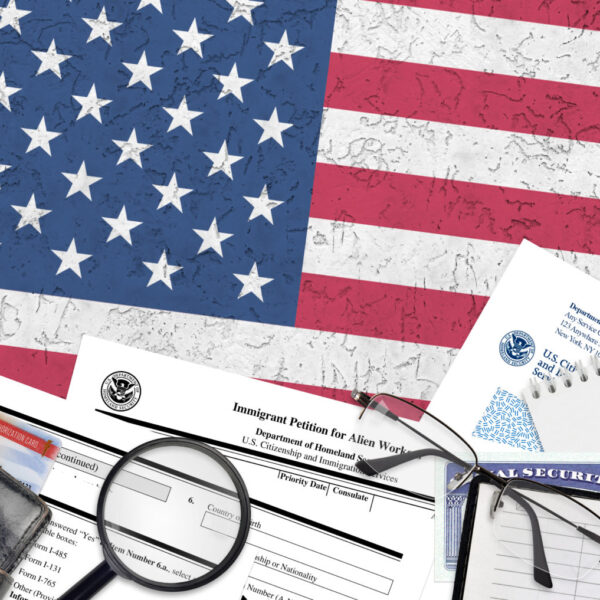
If you are applying for the green card from within the United States, it is essential to understand the role of Form I-693, officially titled the “Report of Immigration Medical Examination and Vaccination Record.”
This article will guide you through the significance of the green card, the immigration medical exam, and completion of Form I-693 to ensure a successful application.
What is a Green Card?
A green card, also known as lawful permanent residence, allows individuals to live and work in the United States indefinitely.
To obtain this immigration status, you will need to file Form I-485, the “Application to Register Permanent Residence or Adjust Status” with U.S. Citizenship and Immigration Services.
Most applicants filing for the green card must also submit the Form I-693 which is completed by specific doctors or “designated civil surgeons.” The form will determine whether an individual is inadmissible to the United States on public health grounds.
I-693 Vaccination Requirements
Form I-693 is a vital part of the green card application process.
It’s designed to identify any medical conditions that might result in an applicant being deemed inadmissible on public health grounds.
These conditions include communicable diseases that significantly affect public health, drug addiction, failure to show proof of certain vaccines, or mental and physical disorders leading to harmful behavior.
Vaccines That Are Required
Before you can get your green card, you need to make sure that you have received the following vaccines:
- Mumps;
- Measles;
- Rubella;
- Polio;
- Tetanus and Diphtheria Toxoids;
- Pertussis;
- Haemophilus influenzae type B;
- Hepatitis B;
- COVID-19; and
- Any other vaccine-preventable diseases recommended by the Advisory Committee for Immunization Practices (ACIP).
The Department of Health and Human Services has designated the following conditions as contagious diseases and risk to public health, which can make you ineligible for a green card:
- Gonorrhea
- Hansen’s Disease (Leprosy)
- Syphilis
- Tuberculosis (TB), Active Only a Class A
If you have active and contagious TB, that can make you ineligible. The doctor will require you to get a chest X-ray and then refer you to the health department in your area for sputum testing.
Who Should Apply for Form I-693?
Most applicants for adjustment of status must submit the Form I-693 to USCIS. There are some exceptions of individuals who are not required to complete the medical exam which include:
- K-1 fiance or K-2 child: if you completed the medical exam abroad prior to admission; you apply for adjustment of status within one year of the medical exam; and the panel physician did not find a Class A medical condition.
- Refugee: if you already completed the immigration medical exam abroad, the panel physician did not find a Class A medical condition, and you are now applying for adjustment of status one year after your first admission.
- Asylee derivative: if you already completed the immigration medical exam abroad, the panel physician did not find a Class A medical condition, and you are now applying for adjustment of status one year after your first admission.
- Afghan national who entered the United States under OAW: if you completed the immigration medical exam abroad, the panel physician did not find a Class A medical condition, and the medical exam was completed no more than 4 years before you file to adjust status.
Qualified Doctors for Form I-693
Only doctors who have been designated by USCIS as a civil surgeon may perform the medical exam.
To find a currently designated civil surgeon, visit the USCIS website, which offers a search tool by location: https://www.uscis.gov/tools/find-a-civil-surgeon
It may take some time to get an appointment so plan accordingly. Also, it may take about two weeks to get the results of your medical exam.
You should be aware that:
- Rates vary by civil surgeon;
- Many civil surgeons do not accept insurance; and
- Insurance may not cover many portions of an immigration medical examination.
Items to Bring to Your Exam
Bring the following to your medical exam:
- Form I-693, Report of Medical Examination and Vaccination Record
- Government-issued photo identification such as a valid passport, driver’s license, or work permit
- Health insurance card, if applicable
- A list of all your vaccines, translated into English if necessary
- Information about any chronic medical conditions or medications you are taking
- If you’ve been treated for psychiatric or mental illness, or alcohol or drug abuse, bring certification from a doctor including diagnosis, treatment duration, and prognosis
- If you have a history of violent behavior, provide information for the doctor to assess its relation to medical issues or substance abuse
- If you had syphilis, a certificate proving adequate treatment
- For individuals with disabilities, a report on their condition and any special education or supervision requirements
- If you’ve tested positive for tuberculosis, bring documentation from your doctor, including treatment details and proof of adequate treatment
- If you’ve had an abnormal chest X-ray, bring the last X-ray films taken
- Payment for the civil surgeon
What Happens at an I-693 Exam?
When you visit a doctor for your I-693 exam, you’ll undergo a brief physical examination, which may include blood and urine tests.
The doctor’s role is to identify any physical or mental conditions that could indicate a departure from your normal state of well-being or level of functioning.
They’ll ask about your medical history, drug or alcohol abuse, mental illness, and any relevant tests or records.
Pregnant women can postpone the X-ray until after giving birth.
Completing the I-693 Exam
The civil surgeon must give you the completed Form I-693 in a sealed envelope for you to submit to USCIS. It is recommended that you also ask for a copy of the exam so that you are aware of the information completed in the form.
It is crucial that the medical exam in the sealed envelope includes the following:
- On the front of the envelope, in type or print in capital letters: “DO NOT OPEN. FOR USCIS USE ONLY”
- On the back of the envelope, the doctor’s initials should be written across the seal where the flap meets the envelope.
- The entire flap is sealed with clear tape and covers the doctor’s initials
You cannot open or tamper with this sealed envelope because USCIS then will not accept it. Also, Doctors do not send copies to USCIS, so you need to submit the sealed form yourself to USCIS.
Download the 14 page I-693 from from USCIS.gov here “Report of Immigration Medical Examination and Vaccination Record.” The current edition date is 03/09/2023.
When to Submit Form I-693
Recently, USCIS extended the validity of Form I-693 from one year to two years. Also, USCIS no longer requires that they receive the medical exam within 60 days of the doctor’s signature on Form I-693.
USCIS encourages all applicants to submit the Form I-693 medical exam with the green card application to avoid any delays in adjudicating the green card application.
However, it is not required that you submit the medical exam with the application to adjust status. If you do not submit the medical exam with the initial green card submission, USCIS will either issue a Request for Evidence to obtain the Form I-693 or request that you bring it to the adjustment of status interview.
Also, USCIS may send a notice if you’ve not submitted a completed and signed Form I-693 along with your Form I-485 application.
This notice isn’t indicative of a delay in reviewing your application or issuing a work permit. It merely serves as a reminder to submit the form either at your adjustment of status interview or upon USCIS’s request through a Request for Evidence.
Avoiding Inadmissibility in the U.S.
The rules for being found inadmissible are laid out in the Immigration and Nationality Act, and they cover a wide range of situations, like health issues, criminal activities, national security concerns, and more.
If you are deemed inadmissible because of a medical condition, there may be a waiver available. The waiver process is lengthy, complicated, and expensive. Currently, the Form I-601, Application for Waiver of Grounds of Inadmissibility is currently $930. The steps to complete the waiver process will depend on the specific circumstances of your case.
I-693 FAQs
The following are some of the most commonly asked questions about Form I-693:
1. What is the I-693 Medical Exam Form?
Form I-693 is a crucial document required by the U.S. Citizenship and Immigration Services (USCIS) as part of the immigration green card process for most applicants. This form must be filled out by a specific doctor or a civil surgeon. It contains details about the applicant’s health, which helps USCIS decide if the applicant is eligible for a green card.
2. Do Refugees Need Form I-693 for Status Adjustment?
Usually, no unless the applicant was found to have a Class A medical condition during the medical exam completed outside of the United States. However, refugees must submit their vaccination record to USCIS.
3. Where to Find an Approved Doctor and how to Set Up a Medical Exam?
You can easily find on the USCIS.gov website a list of doctors who have been authorized by USCIS to complete the medical exam. For added assurance, you can also check with the doctor during your appointment to make sure they are an approved physician. To schedule the appointment, call the doctor’s office directly.
4. What Should I Bring to My Medical Exam?
Confirm with the doctor what you should bring to the medical exam, but in general have the following ready: Form I-693, government-issued photo identification, a list of your vaccines, medical history, and payment for the doctor.
5. What Happens After I Finish an I-693 Exam?
After you complete the medical exam and all the required paperwork is signed, the civil surgeon will hand you a sealed envelope with your results inside. This special envelope needs to be sent directly to USCIS along with your immigration application.
6. What Does an I-693 Exam Cost?
The cost of the medical exam will differ based on where you live and the vaccines and tests you still need to receive. Generally, the exam fee can be anywhere from $100 to $500.
7. K Visa Holders: Do I Need Another Medical Exam?
If you are a K visa holder, and you already had a medical exam before coming to the United States, you might not need to complete another one if you file the Form I-485 within one year of your initial medical exam. Regardless, you must provide proof that you’ve met the vaccination requirements. If you haven’t, you’ll have to complete Part 10 of Form I-693 by seeing an authorized civil surgeon.
Keep in mind, if the overseas doctor found a Class A medical condition, you’ll need another exam, unless you’ve received a “waiver of inadmissibility.”
Conclusion
Obtaining a green card is a significant step towards living and working in the United States permanently. Form I-693 plays a pivotal role in the green card application process, ensuring that applicants are not inadmissible on public health grounds. By following the instructions and scheduling your medical exam in a timely manner, you can avoid delays in obtaining your green card. If you have any concerns or questions about Form I-693 and the green card application process, consider seeking legal assistance from an experienced immigration attorney.




